
March 2013

This is a story about an American citizen who was murdered in Singapore. It has been in the news since the middle of February 2013, even though the incident happened in June 24, 2012. Authors Raymond Bonner and Christine Spolar published the story in The Financial Times (of London). You ought to read that article, or look at Shane's Wikipedia page before you read on. In a nutshell, Dr. Shane Todd was hired by IME, a south-east Asian research institute based in Singapore. One of his projects for IME involved co-developing technology with Huawei, a Chinese telecom company. Shane had misgivings, expressed concern about US National Security, tried to get out of the situation, and was killed. Yes, the evidence is circumstantial but it is overwhelming: the autopsy photos can be seen on a video done by CNN's Miguel Marquez here. The suicide note is ludicrous, and evidence of wrong-doing was deleted off of Shane's hard drive after he was killed. Huawei can claim they were not involved, but documents recovered from Shane's computer show otherwise.
It must have seemed a grand adventure, taking a job in Singapore at a research institute, but it ended up every parent's worst nightmare. If you work in microwave engineering, this could have been you.
There is a lot of speculation in the the news about what happened, partly because it happened overseas. I will try to put a little perspective on it. But first:
The White house runs a web site where you can petition President Obama to get his attention on various topics, and when you hit 100,000 signatures he will respond. Most recently a petition to create a "death star" went over the top, which says a lot about either the stupidity or the silliness of Americans (take your pick). Various other petitions are pernicious attempts to get him to impeach himself over gun control which are not worth your time to read. But please join Microwaves101 in a petition to investigate Shan's murder.
Let's take a look at the places and players in this scandal, and then talk a bit about why China might want to steal the secrets of an eight-inch GaN on silicon line. Here are some hyper links if you want to skip ahead:
Hanging around Singapore
IME
Huawei
Chinese hackers - the new front line
Defense work in the US
Past, Present and Future of GaN
What is export controlled and what is not?
What can you do with a high power GaN-on-Si Transistor?
Hanging around Singapore
99% of Americans could not locate Singapore on a map, or know much about it. The people are 75% Chinese, and China is the second largest trading partner following the European Union. Of Singapore's population of 5.2 million, 23% are foreign born.
According to the World bank, Singapore enjoys the third highest per capita income of $60,688. The United States comes in at eight at $48,112. Singapore enjoys a low crime rate, and it is illegal to own a gun there. Hrrmmm. If you need to play with guns, you can join the Singapore gun club for $3000 plus $300/year.
| Singapore has recently dialed back its use of the death penalty, which ranks up there with China. Executioner Darshan Singh has hanged over 850 people, a remarkable lifetime achievement. You can read about this human rights abuse in the book Once a Jolly Hangman. |
 |
It took just eight days for Japanese forces to capture Singapore in 1942, scoring a record 80,000 British prisoners of war. On 23 February 1946, General Yamasita was hanged as a war criminal for crimes committed in Malaysia, Philippines and Singapore.
IME
IME is the Institute for Micro-Electronics, part of A-STAR which was set up in 1991 to promote technical talents of Singapore. IME's Singapore site looks pretty, but remember that the average humidity in Singapore is almost 80% and the temperature is often in the 90s, so it must really suck to live there.
Click here to go to IME's web site and learn about their mission.
|
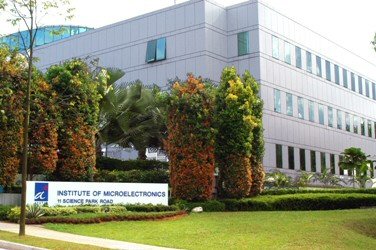 |
Below is a job requisition that is posted on IME's web site as of March 2, 2013, well after Shane's story broke. This was Shane's job, they are still looking to replace him. Don't even consider taking it, unless you wish to bring "suicide" upon yourself. I predict that this requisition will be taken off the IME site in a week or two, in that case, the image below will live on in infamy.
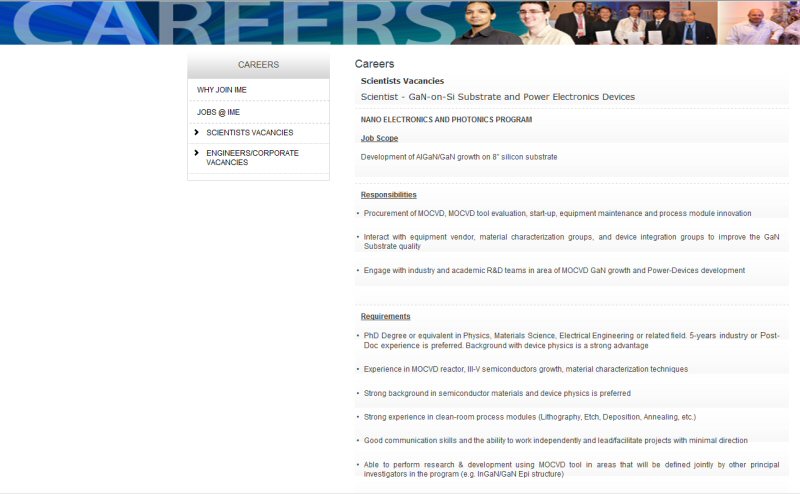
Huawei
Huawei was founded in 1988 and is now the largest telecom in the world, a remarkable feat. Ren Zhengfei, the founder of the company, served as an engineer an officer in the People's Liberation Army in the early 1980s. We are to believe that Huawei is private company that is owned by its employees. However, this could be just a smoke screen to distance the company from the force behind Huawei's success, which might be the PLA or the Chinese government. There is simply no way to know, as it is a "private company" we will never get to see the Huawei books.
The name Huawai sounds innocuous enough. Hwa-wei can be translated as voice-greetings. Din-wha for example is literally "electric voice"... the telephone. And Wei is a form of greeting... you might answer the telephone by saying "Wei-ah".
Who was able to explain that bit of Chinese language and culture to us? An amazing 94-year-old veteran who once served in China in the Radio Corps, who has good memories of his service there and the people we once defended.
More recently, the name Huawei has been associated with scandalous behavior with military connotations. In the United States and Canada, governments have strongly recommended (if not actually banned) telecoms from using Huawei base station equipment as these routers are suspected of stealing data and pipelining it to China. Sixty Minutes has reported that Huawei stole intellectual property from Cisco for use in their routers. Huewei has deep pockets and has settled cases with Cisco and Motorola out of court.
Below is one of Huawei's latest smart phones which they claim to be the world's fastest with a 1.5 GHz processor. Huawei actually buys MMICs from TriQuint in the United States, but you have to wonder what the five-year-plan is. They are also known for buying parts at Taiwan's Win Semiconductor, which is the long run will be a cheaper solution. I won't be upgrading to a Huawei, ever.
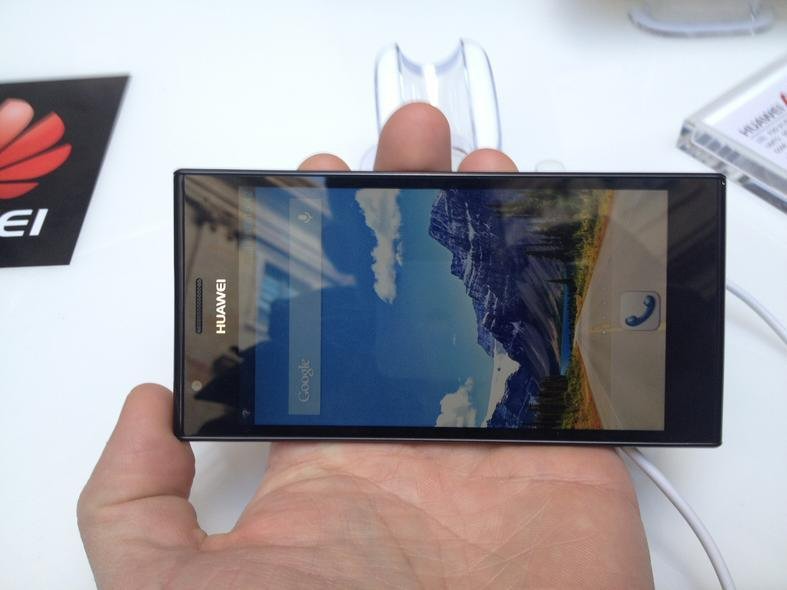
Chinese hackers - the new front line
Huawei has admitted and bragged about hacking telecoms:
http://www.wnd.com/2012/06/china-tech-company-admits-hacking-u-s-telecoms/
China has hacked defense contractors, most recently they attacked Lockheed in a big way.
http://www.infoworld.com/t/hacking/lockheed-hack-should-put-the-us-high-alert-329
If the Rocky and Bullwinkle show was created today, Boris and Natasha would be replaced with He-Ping and Mei-Hua.
Raytheon and Lockheed have both been involved in billion-dollar sales of Patriot missiles to Taiwan. While this keeps stockholders happy, it tends to anger China. Raytheon had to shut down their Beijing Office a few years ago; you can imagine the staff fleeing the country with fake beards while the PLA sifts through the glossy brochures on air traffic control looking for the corporate email address lists.
It is time to admit this: if your company stores data on servers that are connected to the internet, that data might already be in China. This leads to the next topic, of how has the DOD address that threat?
Defense work in the United States
Let's pull back the veil on defense department work, just a little, to put Shane Todd's death in perspective. Shane was not directly involved in defense work, but he sure ended up on the front line. If he had returned to the United States, it would be very difficult for him to obtain a security clearance because of his employment history, which is not something that IME would have disclosed at his job interview.
Freedom of speech... really?
The first and second amendments are often quoted in the United States as the right to do anything and everything. But freedom of speech is not universal if you hold a government issued security clearance: you can't talk about the things you do at work. But it is OK to talk about the process that you must follow to obtain and hold a clearance.
Security clearance are issued by Defense Industrial Security Clearance Office, or DISCO. In order to obtain clearance, you have to fill out the infamous SF86 form, which anyone can download on the Office of Personnel Management. Usually you will be asked to fill it in electronically on the EQIP site where 128 bit encryption is used; don't try this if you are running Windows 95. Encryption makes it nearly impossible for Chinese hackers to access anyone's information, unless of course the data is sent through a Huawei router, then all bets are off. Be sure to keep a record of your data that you gathered, in five years or less you might be filling in this form again, you will save yourself many hours of work the second time around.
The SF86 form can downloaded here. It is currently 127 pages, and starts out by pointing out that if you lie you can go to jail for five years. There are many questions about citizenship, where you have lived, traveled and who your relatives are. Have you been fired from a job? Credit history? Draft number? Military record? By the way, the government does not care if you are straight or gay, but many years ago it was thought that sexual preference could make you be a target for blackmail. Irony alert: if you are gay and a Republican you are a target for blackmail like Arizona Pimal County sheriff Paul Babeu. Oops, it was the other way around, Babeu was blackmailing a foreign national over his indiscretions. Only in a red state could such a situation occur and the culprit get re-elected.
Discrimination in employment?
In the United States we are protected from discrimination by employers, right? In defense work this is not true. You need to have the ability to get clearance, and the government needs to be convinced that you are not involved in terrorism, espionage, or sabotage. If you are involved in adverse activities, chances are it it is because of people you know or are related to are too, so the government is going to have an extremely close look at your associations.
The SF86 asks detailed questions about your parents, children, spouses (ex, current), in-laws, step-relatives and more. Below is a piece I clipped from the form, along with the data that you are asked to provide for each person. Yes, you need to know what city your mother-in-law was born in. Beautiful Brookline, Massachusetts in my case. My mother was born in China to parents that were US citizens, information that would choke the SF86 form 20 years ago. The current form no longer asks for a naturalization number which she never had. This all went down in 1923, but on the SF86 it is as important as yesterday. As they used to say in Maine, if a cat had kittens in the oven, you wouldn't call them cupcakes.
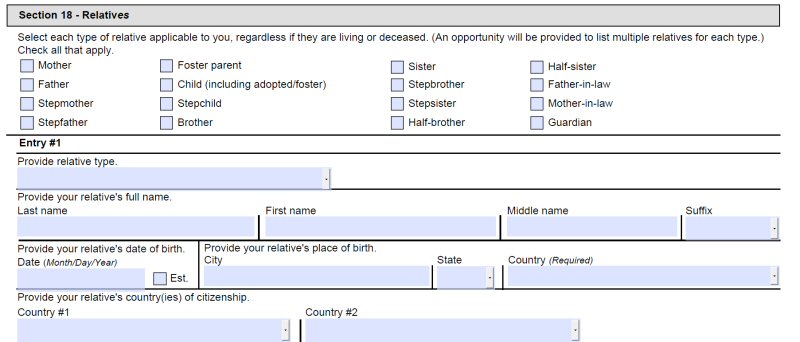
Later in the form you will be asked about your foreign contacts and foreign travel. You will need the dates and countries visited for the last ten years. The DSS web site provides a list of the top reasons that security is denied. Most are related to missing information.
Obtaining a secret clearance is merely a training bra for real "Double-D" DoD defense work. Anything that is classified secret has probably already been stolen or is well known by potential enemies. Ask yourself: how long can you keep the center frequency of a missile a secret? Answer: until you use one. And we just used a shitload. But don't ever take Secret information lightly, just shut up about it, obey the rules and do your job.
What is a SCIF?
The Sensitive Compartmented Information Facility is the way we prevent critical defense information from being hacked. In a SCIF (pronounced "skiff"), there are many precautions that will not allow sensitive data to ever exist on the internet. If there are internet connections in the facility at all, these are on a separate server from the sensitive data. Most programs that reside in SCIFs are not acknowledged, yet some entire buildings at defense contractors contain nothing but SCIFs. I am not telling you anything you can't learn on Wikipedia, except maybe one or two little tidbits. How can you spot the SCIF farm on a defense contractor's campus? It could be the building that has no windows, and lots of cars parked around it. Don't get any funny ideas if you are a future mass murderer, those guards are all well armed and trained, and every door you see is locked and alarmed, and the locks aren't some cheap Chinese Kwiksets, more like what a bank vault would use.
Access to programs out in the SCIFs is an entirely different matter compared to obtaining a Secret clearance. Programs are compartmented such that information cannot pass between them. Each program requires a new review of your SF86 by the particular customer, they can be as picky as they want. Obtaining clearance can take a year or more depending on how many of your relatives and associates they need to think about. If you work for a defense contractor and have never been in a SCIF, either they don't need your particular skills or you are considered a security risk. You are a second class citizen for sure.
The adjudication of clearances for sensitive programs should never be done by contractor personnel; although they help gather your information, they should never be whispering about anyone's SF86 data and should not speculate on your ability to get access. This is the government's role. However, working in a SCIF farm, you will begin to notice something: not only are there very few Chinese-Americans present, your Anglo friends that have married into a Chinese family are also noticeably absent. This will tell you something about the state of affairs between these two countries. You won't learn that on Wikipedia.
Defense policy shift
Since taking office, President Obama has been working a major foreign policy shift, away from the affairs of the Middle East, and into the waters of the China Sea.
Ask yourself, what is the ten year plan for Chinese government? It isn't about buying up our debt (of which they now hold $3T) and sending us containers of lead-painted Happy Meal toys to strain our landfills and make our kids stupider, it is about gathering resources, and reclaiming lost real estate, and not suffering from the coming, predictable scarcities. Before 2030, China will surpass the US in economic power. There is no ten year plan in the US, Congress can't seem to plan for one year out. However, we should expect some future generation to default on our tab (you really don't think your grandchildren and going to be charitible enough to pay off your excesses, do you?) so that we can each contribute as little as possible while living as large as possible. Here we are, now entertain us! Newt Gingrich's last ditch attempt to get nominated as Republican candidate for President was to offer two dollar per gallon gas. Anyone that really thinks that United States refiners would sell their product at two bucks at home when they can get three or four in China is not a candidate for Mensa and has no understanding of the world economy.
Here is a question that the President of the United States will someday have to answer: what will we do when China makes a play for Taiwan? I predict, at best, we will call them names at the UN and let it go. Maybe we can make them a swap: if they forgive our trillions of dollars in debt, we will let them have Taiwan, and throw in Texas as a bonus. Once the oil is gone in the Lone Star State, there really is no good reason to keep the property with the possible exception of Austin which could be walled off as a western destination like Berlin once was. At $3T the price would be $17.5K per acre, well above the $0.02/acre that we paid for Alaska, so the US could live the dream of real-estate-flipper rather than super-power.
Chinese parts used in military systems?
Defense workers are told NOT to use Chinese parts in hardware, for two good reasons: first is potential inferiority of parts, and second is that malicious code may be present.
In the Microwave industry, there are US suppliers for everything you need, as microwave hardware started out as military applications and today serves dual use (military and commercial). Microwave hardware typically is analog, so the opportunities to hide malicious code are few or zero.
One example of Chinese-fabricated microwave circuits being used in military hardware: Hittite Microwave, the original fabless semiconductor company, makes integrated circuits all over the world. After the recent news that they are being tossed out of TriQuint's US fabs, you can be assured that many more of their designs will end up in Win Semi in Taiwan. No one in the defense supply chain seems to care about the origin of Hittite's parts, it is a non-issue if they are reliable and perform well. It is an entirely different ball game for microprocessors, as the opportunity for malfeasance when you have millions of transistors is huge.
GaN past, present and future
Gallium nitride is a compound semi, we all know, but it is hugely impractical to grow native wafers of gallium nitride. The critical semiconducting layers are always deposited on a host substrate using processes such as molecular-beam epitaxy (MBE) or metal-organic chemical vapor deposition (MOCVD). Both techniques can provide excellent product, but MOCVD is more popular as it is cheaper.
Gallium nitride comes in two distinct flavors, GaN-on-Si (silicon), and GaN-on-SiC (silicon carbide). Almost all of the early work in GaN was funded by the US military, starting with funding by Darpa for Raytheon, Northrop Grumman and TriQuint. Darpa was never interested in GaN-on-Si, only the more capable GaN-on-SiC. Darpa goes out of its way to do things the hard way, and has the unfortunate habit of publishing results so that the entire world knows what is possible and what is not.
The DOD had no interest in silicon substrates as it was believed to be an inferior technology, and even if you can work on high-resistivity silicon, it is going to be hard to develop a true MMIC circuit. GaN-on-silicon is principally marketed as devices rather than circuits, but since the beginning of time, amplifier manufacturers have debated whether devices can be assembled into even better amplifiers than monolithic counterparts.
Nitronex was the first company to champion GaN-on-Si. They were ahead of their time which cost their investors a lot of money and led to their near-liquidation. Today, everyone should acknowledge that the future will be bright for GaN-on-Si, for both commercial and defense. You can't argue against the economics of processing on eight-inch wafers that cost about eight bucks each, versus four-inch wafers that cost four thousand dollars each. GaN-on-Si will soon be a billion dollar industry, GaN-on-SiC will forever be a boutique process for customers where cost in no object. The roadmap for high performance will get even more expensive, as the next step up from silicon carbide is diamond.
How long would it take to stand up a capable fab that can produce GaN HEMT products in China? If you answered "five years" you are optimistic, even as you recall that it took us ten years to get where we are today in the US. Remember, they deeply hacked Raytheon and other defense contractors and therefore have a lot of intellectual property to give them a head start.
What is export controlled and what is not?
The origination of gallium nitride was paid for by the United States department of defense, but only in the GaN-on-SiC flavor. Those companies that were able to score early contracts on this technology have been trained since birth that it is an export controlled product because it enables high-power weapon systems.
More than 10 years since the start of GaN development, it turns that the silicon products are all grown up and can really kick ass. And it can be produced way cheaper.
So, GaN-on-SiC was developed by DOD, and GaN-on-silicon was developed using private funds. Does this mean that the former is subject to export control, while the latter is fair game to market without restrictions? The average microwave engineer has no idea. You can look on the Department of Commerce website to learn more. Your best bet is to hire a lawyer, and always apply for an export license whenever you even think about sending any data overseas, let alone hardware.
Are MOCVD reactors forbidden from export to China? No. China is Veeco's biggest customer, but the machines that are sold are for production of LEDs. What is the difference between MOCVD for LEDs and MOCVD for GaN HEMTs? Maybe a Veeco representative could tell us, I surely don't know. I would also welcome a government official to contribute to this discussion and enlighten us all.
If you like boondoggles, you can attend EDI-CON the week of March 12-14, 2013 in Beijing. There you can learn all about topics such as GaN, which is nothing unique, as the IEEE routinely publishes papers on this topic, and Chinese engineers attend the IMS trade shows which are not ITAR restricted.
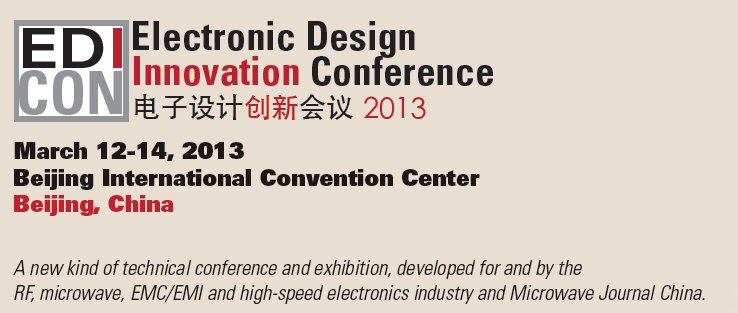
If your company wants to be a "gold sponsor", it is too late, that opportunity is sold out, but there is room for more silver sponsors.
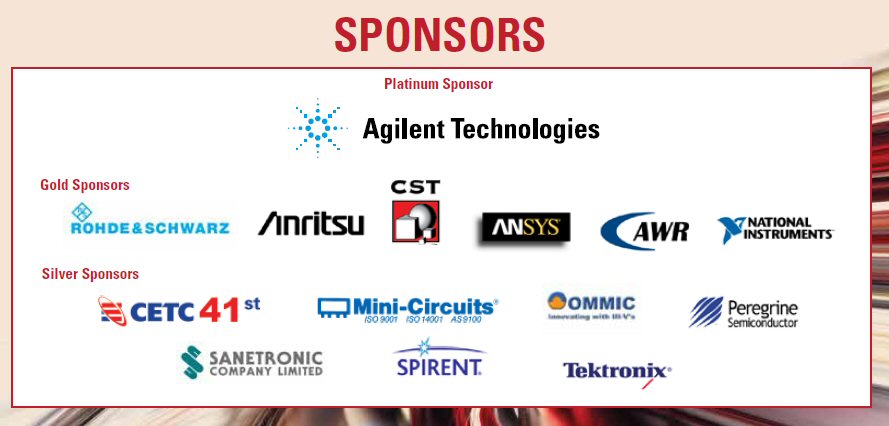
There you can attend a panel session on gallium nitride. which is cosponsored by Freescale Semiconductor and Richardson RFPD. Other presenters of what might once have been considered ITAR-restricted data include Freescale, M/A-COM Technology Solutions, Microsemi, Nitronex, TriQuint and Scintera. Here is the panel session's description:
Gallium Nitride HEMT devices are increasingly being used in high power RF amplifier applications due to this semiconductor’s exceptional high power, high efficiency and wide bandwidth performance. Technologists from leading GaN Device manufacturers will discuss the state-of-the-art for GaN, which applications are best suited for the technology and what RF/microwave engineers need to know in order to implement GaN successfully into their own designs.
You will notice that no defense prime contractors are speaking about GaN at the Beijing conference, while a whole bunch of commercial houses are. Did they all get export licenses for their talks? I doubt it. But maybe they don't need to. Who knows? Should we even care at this point? Those cows are already out of the barn.
Maybe one of the panelists could bring up the story of Dr. Shane Todd for the group to review, but maybe they would later wake up dead.
Note to EDICON attendees: check out the free wireless! don't worry, the Chinese will respect your privacy and won't peek at your email or documents on your hard drive!
What can you do with a high-power GaN-on-silicon transistor?
GaN is a great example of a "dual-use" technology. It has broad application in military and commercial. As for what the applications are, it depends on the particular performance of the part, include whether it is GaN on Si or GaN on SiC. The device that Huawei sought to develop would provide high power and efficiency up to S-band. S-band encompasses cell phone transmitters, and naval radar.
The use of GaN in cell towers is going to be huge. The efficiency of a GaN amplifier can be much higher than competing technologies, and it is able to withstand much higher operating temperatures. If you can eliminate the cooling fan on a cell phone transmitter and you achieve higher efficiency, you have won a major jackpot which will reduce world-wide energy consumption and be much more reliable as you have removed the only moving part. Except if you are Huawei, you won't be allowed to sell this hardware in the United States and Canada because we don't trust you.
Another obvious use of high-power S-band transistors is in megawatt AESA radars for destroyers. Higher power means control of more area from a single ship.
China's latest 052 destroyer has S-band AESAs, see the two panels below that are facing forward port and forward starboard. The beam of the ship is 17 meters, so the faces of the radars are perhaps five meters.
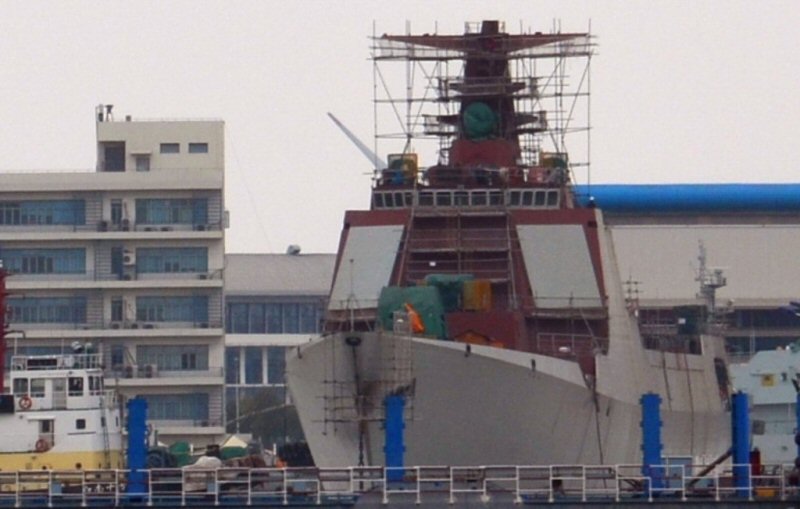
http://en.wikipedia.org/wiki/Type_052C_destroyer#Radar
http://chinesemilitaryreview.blogspot.com/2013/01/chinese-type-052d-red-aegis-guided.html
Let's say the IME/Shane/Huawei amplifier provides 100 watts for purpose of speculation. You can obtain a device at MA-COM Tech that does better than that. Now imagine that one of Shane’s amplifiers is spaced every two inches in a 2D grid behind the face, in the next radar upgrade. This could be the grand prize that Shane was killed over, to cover up the story.
This is all speculation, while we are all waiting for a full explanation of what happened. If you are a US citizen please add your name to the petition to investigate this mess on the White House web site. One of America's best and brightest is dead, we need to find out why. Pass on this warning: before taking technology jobs in Asia, consider what happened to Dr. Todd.
Update April 8, 2013: One of our readers from Singapore offers his perspective on this story. Thanks for writing!
1) "Huawei" does not mean "voice-greetings"
First off, let me just say that the translation of the name "Huawei" are quite off base: Hwa-wei can be translated as voice-greetings. Not at all. "Hua" in this case means either "Chinese" or "Rich". "Wei" means "acts" or "accomplishments". Therefore, "Huawei" probably means "Chinese Accomplishments".
(Which is just like you'd expect a firm with ties to the Chinese Government (ssh, it's a secret!) to call itself...) Din-wha for example is literally "electric voice"... the telephone. That is correct, but the "hua" in "Dian-hua" (in Standard Chinese; you're using the pronunciation from another dialect) is not the same "hua" as in "Huawei".
And Wei is a form of greeting... you might answer the telephone by saying "Wei-ah". Also true, but the "wei" here is not the same "wei" used for greetings.
No disrespect meant to the 94-year-old veteran who offered the translation, but Chinese doesn't work that way.
2) Being of "Chinese" ethnicity doesn't mean that you identify with the "Chinese" Communists
Jeremy Lin is "Chinese", but that doesn't mean that he's a sleeper agent for the Politburo. The same goes for the vast majority of the other people of Chinese descent who don't hold citizenship in the People's Republic of China.
Chinese get around; at the end of the 19th Century, after China had its ass handed to it by the West in the Opium Wars, many Chinese fled to safer places (like San Francisco, for instance, or Singapore). Thus, you can have many people who are "Chinese" inasmuch as their ancestors came from China, but to expect them to automatically identify with a Communist regime that took power only half a century ago would require the same leaps of logic that resulted in innocent Japanese-Americans being rounded up and imprisoned during World War II.
3) Singapore tries very hard to fight off Chinese influence
Singapore was a former British colony up until 1965, and we are a demographic oddity; because of our status as a port linking the Far East and Europe, many Chinese immigrants settled down here. However, this wave of Chinese migration began (and mostly ended) long before China fell to the hands of the Communists; thus, the average Singaporean-Chinese has little if any affinity for the current Chinese regime. In addition, we are surrounded by countries with a mostly Malay ethnicity, and they are extremely wary as well of any demographic shift that may disturb the status quo. Our status as being an ethnic enclave has resulted in many tensions with our neighbours (compare our situation with Israel and its 'friendly neighbourhood').
Our post-independence Government realized that any hint of being pally with China would result in our swift destruction (Singapore is a tiny state; we fell in eight days to the Japanese because our land area is only slightly larger than Toledo, Ohio); they thus quite sensibly took pains to distance ourselves from Chinese influence. We were staunchly anti-Communist throughout the Cold War (in fact, we only began diplomatic relations with China at about the same time Nixon did), and still have long-standing military alliances with Western nations (Changi Naval Base in Singapore plays host to several US Navy ships - and zero Chinese ones). We even have a permanent military training base in Taiwan (China's long-time arch-rival).
We opened up to China for much the same reason that the US did; simple realization that ignoring them was not going to end well for us. In fact, most Singaporeans would argue that we have opened up too much; an influx of immigrants from China is drastically (some say negatively) affecting our demographics. They don't speak our language (we speeky English here), they don't share our values, and THEY'RE TAKIN' ARE JERBS.
Thus, it is painful to read the following paragraph:
99% of Americans could not locate Singapore on a map, or know much about it. The people are 75% Chinese, and China is the second largest trading partner following the European Union. Of Singapore's population of 5.2 million, 23% are foreign born.
Without the necessary context, it could be read as saying that we are somehow compelled by blood ties and trade relations to kowtow to China. This, I fervently hope, is not true. Because...
4) Singapore is f'ed if Chinese agents managed to infiltrate Singapore to murder a US citizen
I hope Point 3 has made it clear that Singapore has historically been at pains to fight off any Chinese influence. Thus, if it is true that the Chinese have successfully managed to pull off a state-sponsored assassination in Singapore without us knowing, we are losing the battle.
This would mean that Singapore is now a battleground of China's economic war against the world. If this is true, I fear for the continued existence of my country, one which I have sworn to serve and defend (all fit Singaporean males serve in the military; it's no fun to 'play with guns' if both it and your ass are government property).
5) Yeah, it kinda sucks to live in a climate like Singapore's
In fact, it's much like living in Fort Lauderdale in the summer, if Wikipedia steers me right.
Shane Todd's death is a tragedy. Let's not forget that. But let's also not be too hasty in pointing fingers at parties which may be ultimately just small players caught in the crossfire of inter-superpower tussles.
Check out the Unknown Editor's amazing archives when you are looking for a way to screw off for a couple of hours or more!